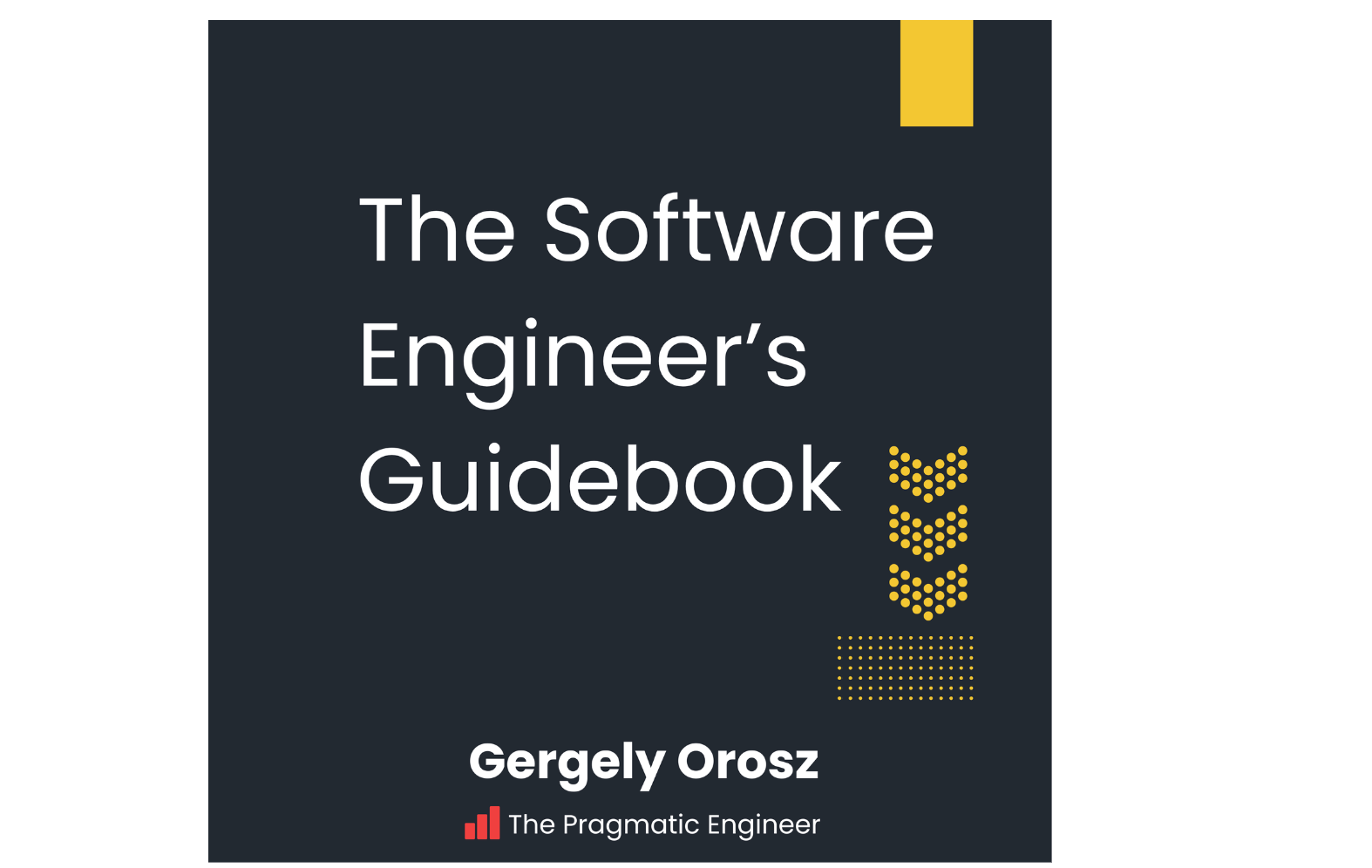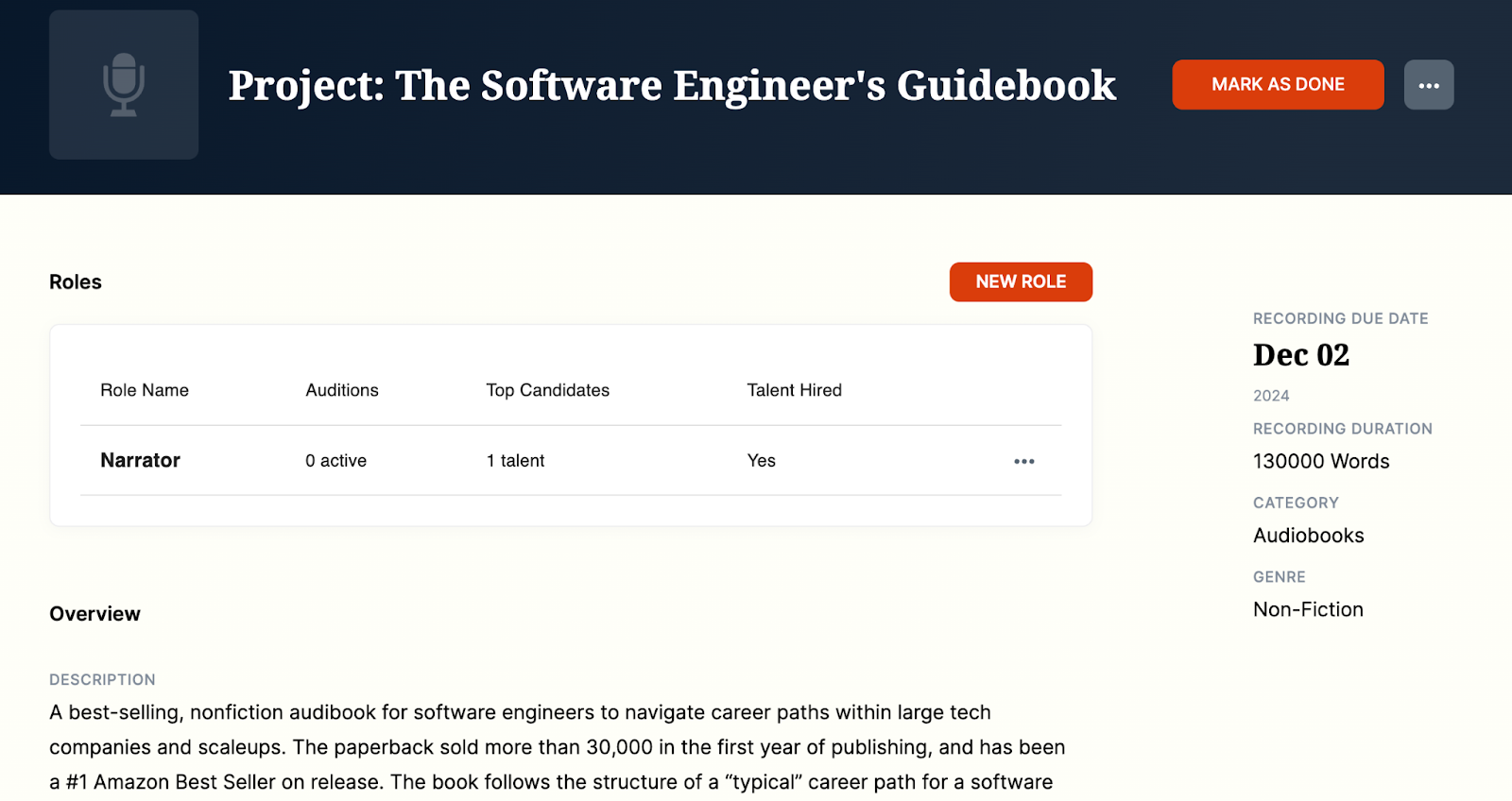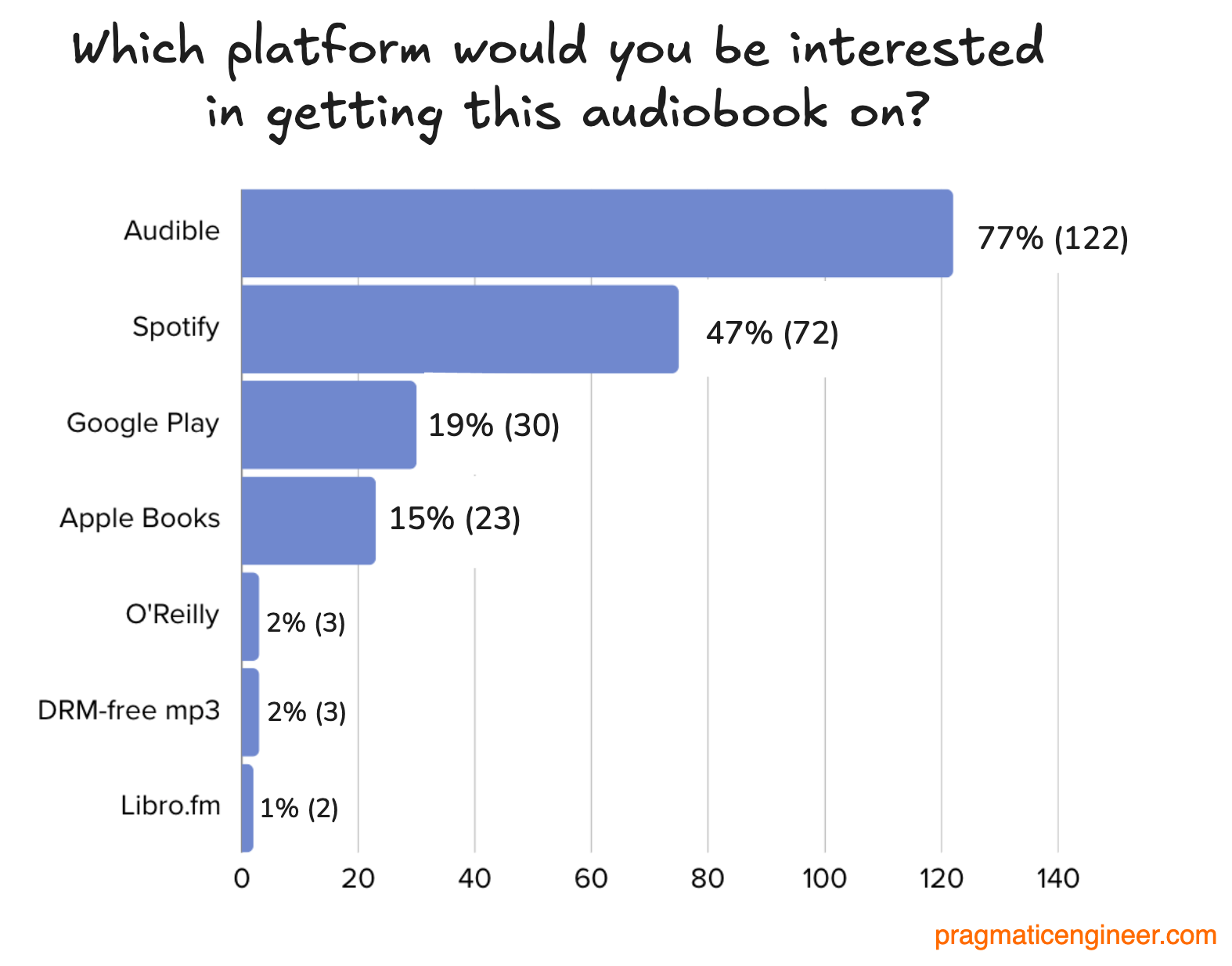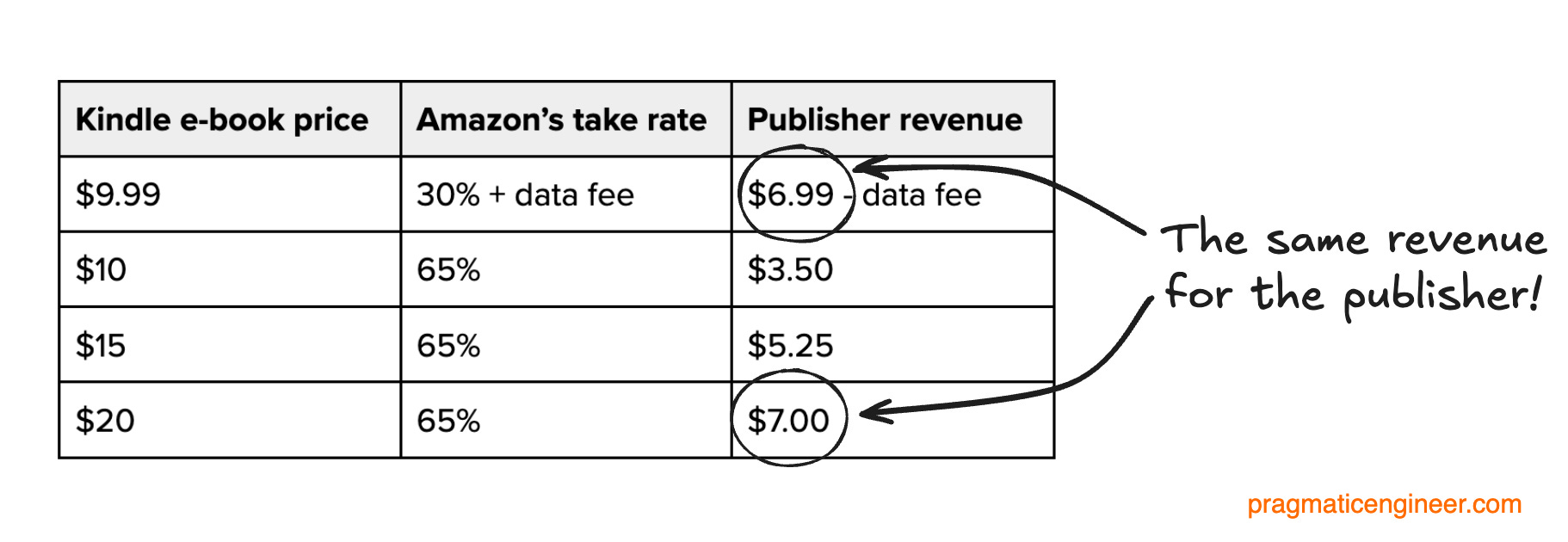Newsletter Title: Why my new audiobook “The Software Engineer's Guidebook” is everywhere except on Audible
Why my new audiobook “The Software Engineer's Guidebook” is everywhere except on AudibleThe new audiobook of my latest title is published today, and it’s available almost everywhere – but not on the world’s biggest audiobook platform. Let me explain why…
👋 Hi, this is Gergely with a free issue of the Pragmatic Engineer Newsletter. If you’ve been forwarded this email, you can subscribe here. A year after The Software Engineer’s Guidebook was published, the audiobook version is here! The good news is it’s available on ALMOST all major audiobook platforms:
My goal with this new audiobook has been to create a product of standout quality. It took months to find the perfect narrator, Nikola Hamilton, who’s a New York-based audio engineer, and to then create an audio version that is a great listening experience. Today’s issue covers:
1. Creating an audiobookAn audiobook is simply a series of mp3 files with metadata. Each file represents a part, or a chapter, of a book. For example, the structure of my audiobook is:
The metadata contains the title, the description, keywords, ISBN number, and the additional files for the audiobook. ISBN number is an interesting one for first-time authors / publishers. All books, e-books, and audiobooks need an ISBN. meaning International Standard Book Number. This number is like an uuid that is unique for not just each book, but for each edition (e.g. second edition), and format (e.g. hardcover / softcover). However, the number remains the same. An ISBN number is surprisingly expensive: one costs around $125, but it gets cheaper when buying in bulk (e.g. 10 costs $300, and 1,000 costs $1,500, meaning the cost per number is reduced to $1.50). As a self-published author, I’m surprised by how expensive a unique number is. ISBN numbers can be used to “lock in” a publication to a platform. Digital publishing platforms like Amazon’s Kindle (e-book), and Spotify’s Findaway platforms offer ISBN numbers gratis. The catch is that ISBN numbers on platforms cannot be used to distribute elsewhere: an e-book with an ISBN number issued by Kindle cannot be used to distribute on other platforms. Finding a narratorProfessional-grade audiobooks need to satisfy a few requirements:
You can narrate an audiobook as a solo project, but it’s a lot of work: it takes practice to develop a “recording voice” for audiobooks, you need to hydrate while recording to maintain the vocal performance, and keep a steady, consistent tone and pace throughout. Professional audiobook narrators can record 4-8 hours of material per day. Non-professionals take much longer to produce a lot less: re-recording of sentences and even individual words takes time, and one hour of “clean” recording could take 2-3 hours to record. I decided to hire a professional voice actor who's an expert at recording audiobooks. As a bonus, some voice professionals do the editing, too: meaning they deliver an mp3 that’s close to being the final version. Here are popular platforms for finding narrators:
The concept of an audition was new to me as a first-time audiobook publisher! When narrowing down narrators based on pre-recorded samples, it’s apparently common practice to send audition requests for up to a few minutes of material, unpaid. In my case, I tried to have as few auditions as possible by relying on pre-recorded samples, and I kept my audition text short. After all, auditions are additional work for these people. In the end, I had two auditions on Voquent, and two on Ahab. I found the narrator of my new audiobook book, Nikola Hamilton, on Ahab. Finding the ideal voice is tricky. I did not predict how difficult it would be to find the “right” voice for my book. I must have listened to 300+ demos, and the biggest problem I had is that most sites offering voice actors for hire seem to specialize in shorter form voice work like adverts, and there is no way to filter voice actors who have produced at least one nonfiction audiobook. So, regardless of how I set filters, I still had 500+ matching profiles, without knowing if they were even interested in doing a lengthy audiobook. Ahab Talent was the first site that allowed me to filter based on the number of audiobooks produced, and by the genre. Making an offer and auditioningThe most common payment type in the audiobook industry is a price PFH (per finished hour). PFH means the voice actor does the work of retakes and editing of the audio track, like removing pauses. When listing a project on any platform, budget and pricing is set up front, for voice actors to know whether to invest their time in auditioning. I offered $500 PFH on all platforms. This was after doing research that suggested the common range PFH is closer to $200-250 for less experienced narrators, and $400-500 for the more experienced. Final audiobook length can be estimated based on wordcount. The Software Engineer's Guidebook contains 130,000 words (which is pretty long at 400 pages of above-average page size. Online calculators estimated a total listening time of around 15 hours. In the end, this estimate was accurate to the minute: 15 hours, 9 seconds! The audition turnarounds took only 24 hours, and I had confirmed my narrator within hours of hearing their audition. Iterating on the recordingAfter finding the right voice, here’s how I proceeded:
Correcting the print and e-book editions was an unexpected outcome. The audiobook recording process revealed nearly a dozen minor errors in The Software Engineer’s Guidebook, despite two additional editing passes by Dominic, the hawk-eyed editor who edits The Pragmatic Engineer. Most were nuanced and almost impossible to spot unless thoroughly reading the book – or, in this case, hearing every word! Submitting the audiobookWith the mp3 files recorded and complete, I needed to decide where to submit the audiobook for distribution. The options were:
In the end, I chose Findaway Voices, thanks to its first-class support for Spotify. Also, I’d like to support Spotify as a much-needed challenger to Audible’s monopolistic pricing practices. I had to do a few more things before submitting the audiobook:
After submitting, it takes up to a week for Findaway Voices to approve a book. In my case, this was cut to a day, likely due to having direct contact with the Spotify Audiobooks team, who reached out after hearing that an audiobook version of The Software Engineer's Guidebook was to be published. With that, the audiobook was set to “go live” on the agreed publishing date, which is today! You can listen to a sample and get the 15-hour-long audiobook, here. (Print and ebook versions also available.) 2. Audible’s audiobook monopoly and monopolistic practicesAudible is a model example of a Big Tech company with an invisible de facto monopoly of a market. Customers are happy, but authors and publishers are not. I suddenly find myself directly impacted by such practices that go unchallenged, and which won’t change without competition or regulation. Now is a good time to talk about that. So, why is the audiobook of The Software Engineer's Guidebook not on Audible? Originally, I really wanted to avoid supporting a business that treats authors and publishers like only a monopolistic company can. But it’s clear that most of my readers prefer to listen on Audible. For this reason, I’ve made the book available on Audible, although I recommend purchasing it anywhere except there. However, Audible’s unusually slow approval process means my audiobook isn’t even available on Amazon’s platform, yet. I submitted the book to Audible at the same time as I did for every other platform, six days ago. In a sign that Audible is way too comfortable in its position, they can take up to 25 days to approve new books in busy times like now – though the official estimate from Amazon is 14 business days (3 weeks). So, it will be on sale there when approval happens, likely either late 2024, or early 2025. Audible’s dominationIn 2008, Amazon acquired audiobook startup Audible for $300M, and kept it as a separate brand while integrating it nicely with Amazon’s books and e-books features. The strategy worked wonderfully: today, Audible is the clear market leader in audiobooks. In 2022, it had a dominant, 63.4% market share in the US, as per IbisShare. I ran my own survey in November last year, asking people wanting to buy the audiobook version of this: “Which platform would you be interested in getting this book on?” Following 159 responses, the results illustrated Audible dominance – though one possibly challenged by Spotify: It’s clear most people would prefer to use Audible. I’m sorry that the book is not yet available – we’re getting into Audible contributing to this. Amazon’s monopolistic pricing with Kindle and Audible“Take rate” refers to the percentage of revenue a platform takes from merchants selling on it. Take rate examples:
When it comes to audiobooks, Audible has alarmingly high take rates:
How can Amazon command such sky-high take rates for what is effectively storing and streaming mp3 files, as well as building and maintaining the Audible app? It’s most likely because they dominate the market and can charge almost what they like because customers prefer Audible. A take rate for digital goods that’s above 50% is something I associate with monopolistic pricing. Already on Amazon Kindle, Amazon sets a 65% take rate for any book priced at $10 or above. So, when buying the $25.99 ebook on Amazon, Amazon makes $16.90, and the publisher (me!) gets $9. Monopolistic pricing is bad for consumers. Have you noticed there are few to no ebooks priced between $10 and $20? They are either $9.99, or start from $20-21 upwards. Amazon’s Kindle pricing policy makes it illogical to price ebooks between the $10 and $20 range because books priced between this range result in less revenue for the publisher, than if they sold the book at $9.99: This pricing policy most likely means e-books that would otherwise be listed in the $10-20 range, are sold to customers for $10 more. Regarding Amazon’s Kindle hardware, two things can be argued as defences:
Audible’s smart play to lock out competitorsInterestingly, Audible has a significantly higher take rate rate for audiobooks (60% or 75%) than Kindle has for e-books (30% or 65%), despite Audible not having created custom hardware for audiobooks. It has something just as valuable though: the largest exclusive collection of audiobooks! Audible manages to maintain its lead in exclusivity by offering to lower its take rate for Audible-exclusive audiobooks. And if we assume that Audible, indeed, has 65% market share: then a publisher will probably make more money if it releases the audiobook exclusively on Audible, and gets paid 62% more per book (by being offered a 40% royalty, instead of a 25% one. Therefore, it makes $4 on a $10 audiobook, rather than $2.50). Until Audible’s market share drops below 50%, it’s a financially bad decision to not sell audiobooks exclusively on Audible. With this tactic, Audible achieves two things at once:
Best-selling fiction author takes on AudibleIn 2022, best-selling fantasy novel author, Brandon Sanderson, had concluded that the way Audible treats authors and publishers is unfair. He made the then unprecedented move of not releasing his latest audiobooks on Audible, at all; instead making them available for purchase directly, and putting them on Spotify. In his words:
Sanderson’s effort to force Audible to treat authors more fairly seemed to work. A year later, Audible offered a much better financial deal for Sanderson, who took the deal, but only because Amazon said they’d roll out the same royalty structure to all authors. From Sanderson’s follow-up post:
Audible drags its feetIn July, Audible announced a new royalty model with fairer rates for authors and publishers, is coming. However, the announcement lacks specifics, and the model doesn’t apply to authors like me. Amazon encourages authors to reach out to Audible over an email “for more information.” I did this, asking how I can be part of the same royalty model that was promised for all authors to come in 2024. I received no meaningful answer. Audible has no incentive to lower its take rates. The company would be giving up revenue, and unless there’s a competitor, or a regulator, forcing them to change course, it runs counter to the company’s interests. I predict that eventually a regulator could launch a probe into potentially anti-competitive pricing practices by Audible. But if it happens, a resolution is years away. Meanwhile, customers will face higher audiobook prices, and authors and publishers on Audible will continue to de-prioritize audiobooks due to the relatively low earnings, compared to paperbacks and e-books. If possible, avoid Audible for audiobooksAudible is a fantastic product for customers, and Amazon has done a lot to make audiobooks more popular and widespread. Even so, it continues to treat authors and publishers poorly, offering pretty empty-looking commitments to improve things. Know that any time you purchase an audiobook on Audible, 60-75% goes directly to Amazon. On other platforms, this rate is never more than 30%. So, even if you spend the same amount on an audiobook outside of Audible, the author/publisher earns at least double. I have no illusions about changing a Big Tech giant’s policy for audiobook authors. This is especially true after seeing what happened with Brandon Sanderson, who selflessly fought to secure a better deal for all authors, only for Amazon to not change anything for most of them. If you would like to see more and better audiobooks at more competitive prices, then purchasing audiobooks anywhere except Audible is a small thing that can, over time, make a difference. Spotify to challenge Audible?The most straightforward way to make Audible offer fairer pricing to authors is if it faces a significant competitor which enables authors to deprioritize Audible. Spotify is a product for which audiobooks are a pretty natural extension of its existing offering. Spotify has been aggressively investing in this area; it came up with the concept of 10 hours of free audiobooks for paying subscribers, while balancing royalties at a level well above Audible’s. It’s strange to find myself rooting for an already giant company; Spotify is valued at $100B, in this potential audiobook battle between two titans. Still, it feels like Spotify operates with a startup mentality: they want to aggressively grow, and treat customers and authors alike as best they can. Currently, Audible is a cash cow product, where the likely business goal is to keep extracting revenue from the customer base, and to innovate as little as necessary, all while growing increasingly complacent. A lack of “hustle” is visible in how Audible operates today. As a reminder, the primary reason why The Software Engineer’s Guidebook is not on Audible, but can be purchased on every other relevant marketplace, is that Audible takes 2-3x longer to approve and list an audiobook than any competitor. Are market forces gathering which will force Audible to change its ways? While we wait to find out, you can get the new audiobook of my latest title on any of these platforms. I hope you enjoy the audiobook of “The Software Engineer's Guidebook”. It has been a long process, but I’m really happy with how the spoken word version has turned out. There are many ways to purchase this title which support myself as an author/publisher. And who knows, it should be on Audible soon, too; as and when the world’s most important audiobook platform gets around to listing it. You’re on the free list for The Pragmatic Engineer. For the full experience, become a paying subscriber. Many readers expense this newsletter within their company’s training/learning/development budget. This post is public, so feel free to share and forward it. If you enjoyed this post, you might enjoy my book, The Software Engineer's Guidebook. Here is what Tanya Reilly, senior principal engineer and author of The Staff Engineer's Path said about it:
© 2024 Gergely Orosz |




